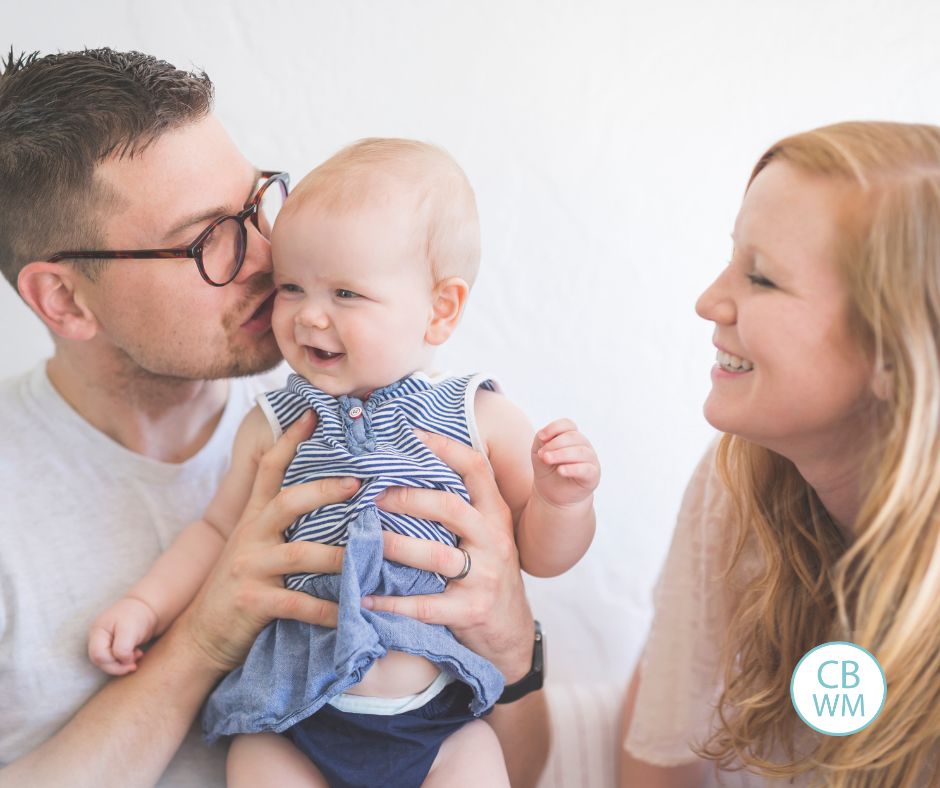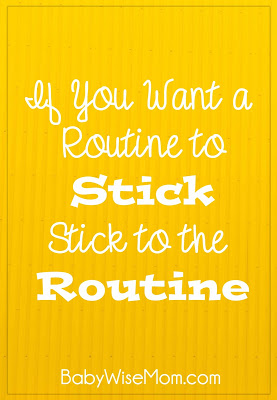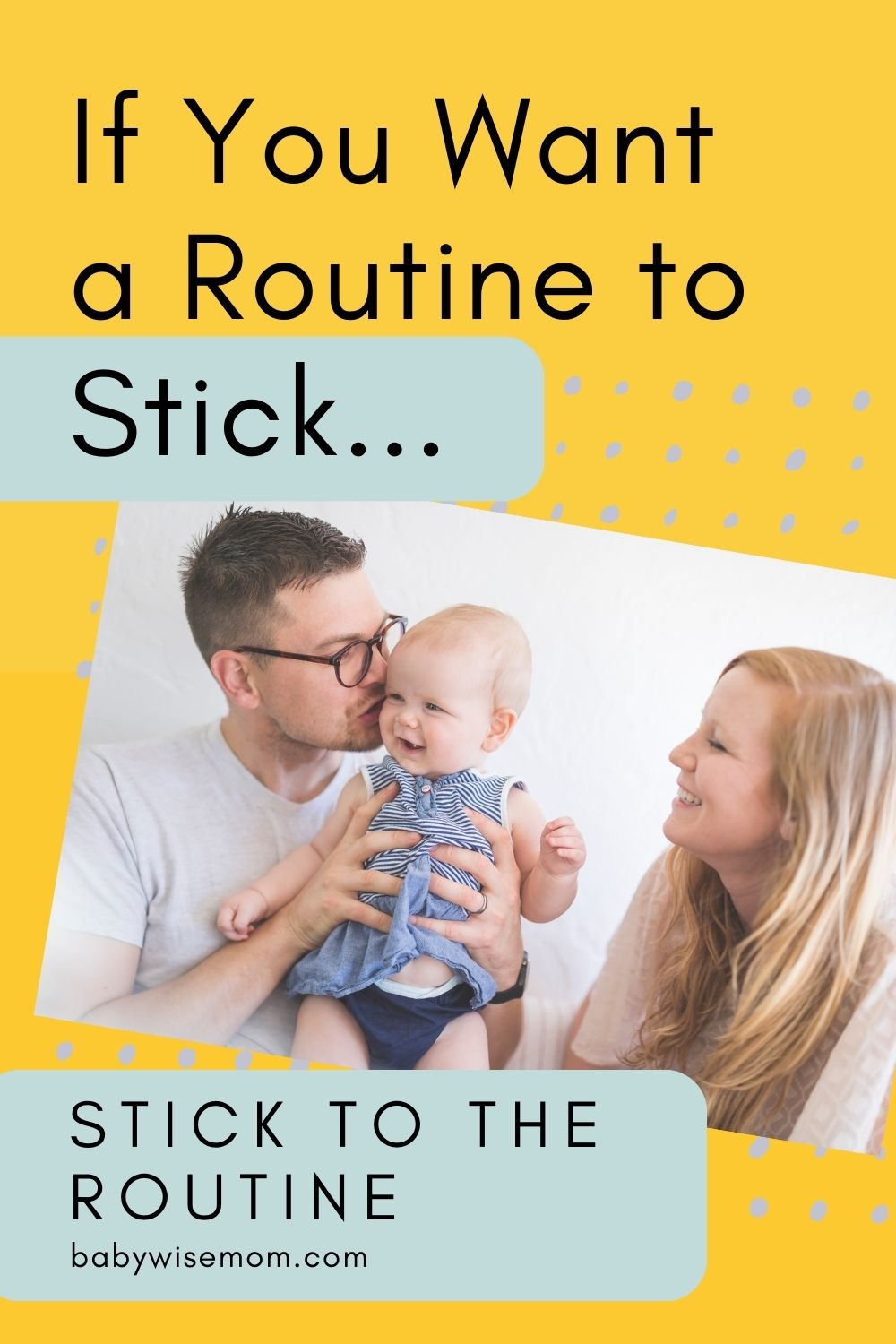If you want your baby to really be on a solid routine, you have to have some consistency with that routine.

A routine sounds really nice in theory. Baby eats at about the same times each day. Baby naps at the same times each day. Life is predictable. You can make appointments and lunch plans with confidence because you know what your day will look like.
A routine is much harder in practice. You can feel like you are doing what you are supposed to do and yet your baby is not falling into that predictability you have dreamed of. If you are feeling frustrated, say this to yourself…
If you want a routine to stick, stick to the routine.

Chances are if a routine is not sticking, you are not sticking to the routine as tightly as you should be. You are probably having more interruptions than your baby can handle and still fall into a predictable routine.
Babies Are Different
Babies are all different. Some can have a disruption each day and still fall into a predictable routine. Others will have a hard time with one disruption a week. You will find the babies who are flexible as a baby will be more flexible toddlers on up.
Those who struggle with disruptions will have a harder time with disruptions later in life, as well. You can’t think, “Well, my friend’s baby goes out every day and does great with the routine! Mine should be able to also!”
The trick is you need to be willing to stick to the routine as much as your child needs it. Do not think you can force your baby to conform to your idea of flexibility. All babies are different and as a parent, you need to recognize your baby’s individuality and respect that. Let me share a bit about my four kids and their ability for being flexible.
When Brayden, our oldest, was born, we thought we would just continue life as it had been and he would tag along. Sure, we would have to pack more stuff, but life would continue on.
Oh boy. That didn’t work out at all.
We added a routine about four weeks in and that improved things, but we still had consistent disruptions. It wasn’t until he was four months old and I decided we were being very unfair to him switching life up so much that things improved for him. We were trying to please everyone and be everywhere we were asked to be. I put my foot down and laid some ground rules for how often we would do things. I decided we were going to give him some foundation before we asked him to be flexible. Oh how things improved!
I have noticed, as I mentioned, that children who were flexible as babies are naturally more flexible as older kids. To this day, Brayden has a hard time when things get switched up. He has a hard time when he doesn’t know what to expect.
Yes, we work with him to learn to be more flexible, but it is a learning process. You can’t just demand that of a person and expect it to happen. I, myself, like routine and predictability, even though I didn’t grow up with a routine (other than what I imposed on myself. Seriously, I gave myself a bedtime starting in second grade).
My next two children were far more flexible. McKenna was quite flexible. She was a deep sleeper. She could fall asleep in one place and get moved to another and stay asleep or even wake up and go back to sleep. You could argue she learned to be more flexible because we were on the go more with two older children. There may be some small truth to that. However, let’s keep in mind that we asked much more of Brayden when he was a baby than we asked of McKenna. We disrupted him far more. After Brayden, I was always much more careful to stick to the routine because I saw what a benefit that was to him. Today, McKenna is still a flexible person. She is happy-go-lucky and rolls with life.
Here is the clincher. Along came Brinley. From the beginning, I could tell she was a lot like Brayden in personality. We had a busier lifestyle than any of my other kids had entered into. Like Brayden, however, she did not do well with disruptions to her routine. Brayden didn’t sleep through the night until he was 6 months old, and I didn’t want to relive that. I made sure we respected Brinley’s preference for sticking to her routine.
I did a lot of carpooling, getting babysitters, and staying home to keep her on routine in the early months (Managing Baby Plus Older Kids’ Activities). And like Brayden, she does not handle disruptions well today. Even a Saturday is stressful for her since it is different. Now, as babies, Brinley could handle disruptions with grace. She could miss a nap and stay very pleasant. She could roll with things when I NEEDED her to. That is because 95% of the time I stuck to her routine for her. I only asked her to be flexible when necessary. I stuck to that routine as much as possible so that she could handle the disruptions. If you have a child who can’t be very flexible, see my tips here for helping establish some flexibility in life: “Flexible-izing” a Baby
I share that all to illustrate to you that your level of flexibility and having a baby who sleeps well and sticks to a routine and schedule will vary from child to child. You need to stick to that routine as much as that child needs you to stick if you want that child to stick to your hoped routine.
If you want your routine to stick, to be reliable, then you need to stick to it reliably.
Related Routine Posts:
- Managing Baby Plus Older Kids’ Activities
- “Flexible-izing” a Baby
- The Value of a Schedule with a Toddler
- Tricks for Getting Baby on a Consistent Schedule
- Let Your Schedule Serve You, You Don’t Serve Your Schedule
- Parenting on a Schedule Can Be Hard
- Understanding Flexibility

